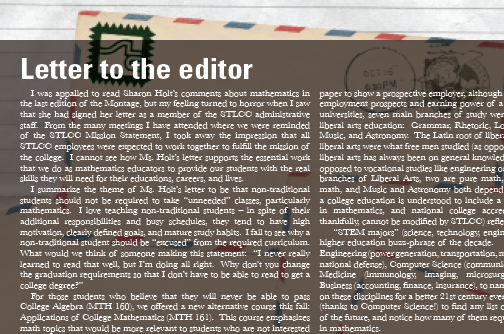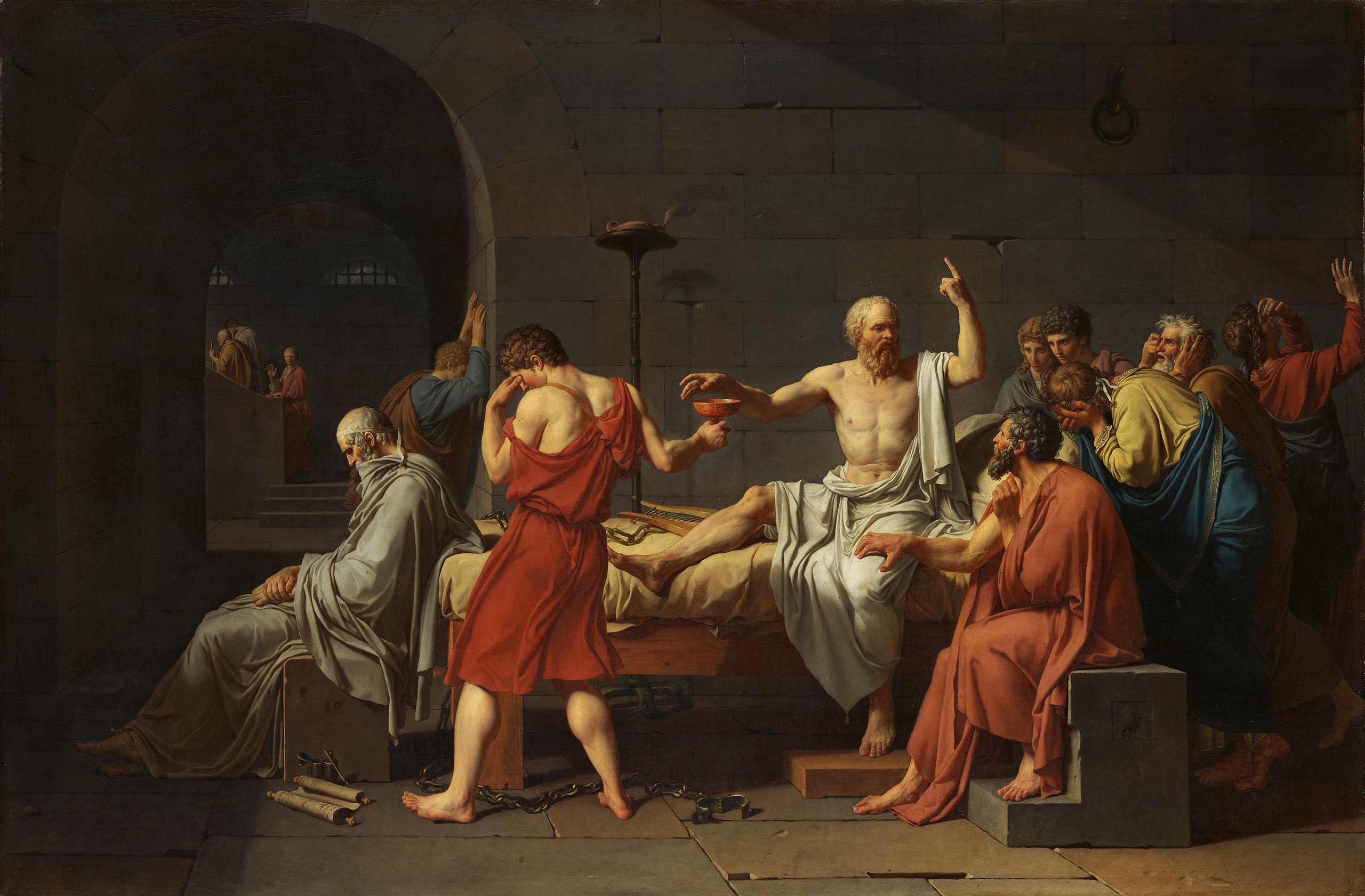Math department pushes for necessity of general education courses
I was appalled to read Sharon Holt’s comments about mathematics in the last edition of the Montage, but my feeling turned to horror when I saw that she had signed her letter as a member of the STLCC administrative staff. From the many meetings I have attended where we were reminded of the STLCC Mission Statement, I took away the impression that all STLCC employees were expected to work together to fulfill the mission of the college. I cannot see how Ms. Holt’s letter supports the essential work that we do as mathematics educators to provide our students with the real skills they will need for their educations, careers, and lives.
I summarize the theme of Ms. Holt’s letter to be that non-traditional students should not be required to take “unneeded” classes, particularly mathematics. I love teaching non-traditional students – in spite of their additional responsibilities and busy schedules, they tend to have high motivation, clearly defined goals, and mature study habits. I fail to see why a non-traditional student should be “excused” from the required curriculum. What would we think of someone making this statement: “I never really learned to read that well, but I’m doing all right. Why don’t you change the graduation requirements so that I don’t have to be able to read to get a college degree?”
For those students who believe that they will never be able to pass College Algebra (MTH 160), we offered a new alternative course this fall: Applications of College Mathematics (MTH 161). This course emphasizes math topics that would be more relevant to students who are not interested in a high-technology program of study. The level is still rigorous enough to count as math credits towards a degree, but the focus is on real-world applications. It is not designed to be “easier”, but I believe that a student who lacks either the intellect or the perseverance necessary to pass College Algebra or the new Applications course is not qualified for a bachelor’s degree. College Algebra is high school Algebra II, which typically is taken by sophomores and juniors. I know that many of our students come to Meramec without an adequate math preparation from their high schools, but we can help them overcome that! We had to cancel three out of four Meramec sections of MTH 161 this fall due to low enrollment. Students, please ask your advisors whether this class might be an appropriate way for you to complete your college math credit requirement.
If a student wants to obtain credentials without expending too much effort, I could suggest a few diploma mills in the St. Louis area or online, but I would warn that student to not borrow too much money to “earn” that diploma, or expect many calls from employers requesting an interview. Resume reviewers all know which institutions are meaningfully accredited and which ones are not. They also can learn many things about a job applicant’s qualifications by looking not only at transcript grades, but the kinds of courses he or she took. No matter what the job title, strong grades in math courses indicate not so much genius, but logical thought process, precision of expression, problem-solving skills, consistent attendance and work habits, attention to detail, and mental toughness. None of these characteristics are directly about “finding x”!
What does a college degree represent? It is more than just a piece of paper to show a prospective employer, although it certainly does change the employment prospects and earning power of a graduate. In the medieval universities, seven main branches of study were defined as essential for a liberal arts education: Grammar, Rhetoric, Logic, Geometry, Arithmetic, Music, and Astronomy. The Latin root of liberal is “liber”, meaning free – liberal arts were what free men studied (as opposed to slaves). The focus of liberal arts has always been on general knowledge and rational thought, as opposed to vocational studies like engineering or law. Of the seven original branches of Liberal Arts, two are pure math, Logic is inseparable from math, and Music and Astronomy both depend heavily on it. To this day, a college education is understood to include a certain level of proficiency in mathematics, and national college accreditation standards (which, thankfully, cannot be modified by STLCC) reflect this assumption.
“STEM majors” (science, technology, engineering, mathematics) is the higher education buzz-phrase of the decade. Math is the cornerstone of Engineering (power generation, transportation, manufacturing, construction, national defense), Computer Science (communications, data management), Medicine (immunology, imaging, microsurgery, chemotherapy), and Business (accounting, finance, insurance), to name just a few. We all depend on these disciplines for a better 21st century everyday life. Do a web search (thanks to Computer Science!) to find any list of high-demand professions of the future, and notice how many of them require a thorough preparation in mathematics.
Even for those who do not want to be an accountant or immunologist, math is essential. As citizens and voters, we must be able to read and interpret a graph from a newspaper, understand how statistics are used (and potentially abused!), and judge an argument based on logic rather than emotion. As employees, we must be able to analyze a pay stub and file a tax return. As consumers, we must be able to construct a budget, evaluate the terms of a loan, determine the “better buy”, and compare investments.
Traditional middle class career opportunities are changing radically, and those who wish to live a comfortable life and provide one for their children must do whatever they can to obtain increasingly necessary high-level skills. Reducing the mathematics requirements for a college degree would be going in exactly the opposite direction of what we should be doing. To use a so-last-millennium metaphor, those who are content to ride in the technology cart instead of helping to pull it (and that’s you if you spend all day on your smartphone but mock “misfit” STEM majors) may eventually find that there are not enough pullers to keep us all moving forward.
What do you think will happen then to those still sitting in the cart? In a civilization increasingly dependent on technology, each one of us faces a choice: embrace mathematical literacy and the benefits it brings to all of us, or be left behind. It’s that simple.
On behalf of the Meramec Math Department,
Julie Tucker – Assistant Chair
MS Engineering
MA Mathematics












